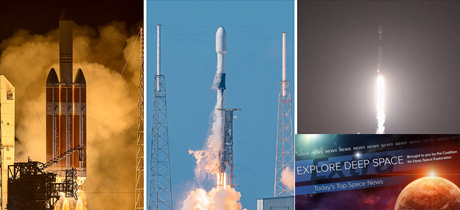In Today’s Deep Space Extra… NASA and its commercial partners deal with tropical storm impacts on Space Launch System (SLS) development and International Space Station (ISS) Mission Control requirements.
Human Space Exploration
NASA hopeful SLS Green Run test remains on schedule
Coalition Member in the News – Dynetics
SpaceNews.com (8/25): Despite a halt on work at NASA’s Stennis Space Center, agency officials are hopeful of keeping a ground based full duration firing of the Space Launch System (SLS) core stage on schedule for the end of 2020. The work was suspended as two tropical storms, first Marco and then this week Laura, took aim at the Gulf Coast. “I’m still hopeful we’ll do a wet dress in September,” Kathy Leuders, NASA’s associate administrator for Human Exploration and Operations, told an August 25 online presentation before the American Institute of Aeronautics and Astronautics (AIAA) Propulsion and Energy conference. “If we get through wet dress in September, we’re in a good spot to be able to do our hot fire by the end of October.” The Stennis based tests are to keep the first uncrewed test flight of the SLS and an Orion Crew Capsule on course for late 2021. Other challenges faced by NASA include workplace responses to the coronavirus, stress across the supplier base and funding.
NASA astronaut Jeanette Epps gets another assignment to the Space Station after canceled trip
Coalition Member in the News – Boeing
The Verge (8/25): NASA announced Tuesday that astronaut Jeanette Epps has been added to the first operational crew launch of Boeing’s CST-100 Starliner to the International Space Station (ISS). Boeing must first re-fly an uncrewed test flight of Starliner, a requirement for NASA certification that was cut short while in flight last December due to software issues. Boeing plans to re-launch the test flight late this year and conduct a follow on test flight with astronauts on board in early 2021. If all goes well, the operational flight would launch soon after NASA certification with Epps joining Sunita Williams, a NASA spaceflight veteran, and Josh Cassada, who like Epps is preparing for his first spaceflight. Epps was to launch on a Russian Soyuz to the Station in June 2018, but was re-assigned earlier in the year.
Station crew re-enters U.S on-orbit segments, Mission Control preps for storm
NASA/Space Station blog (8/25): After three days of being restricted to the International Space Station’s (ISS) Russian segment Zvezda module, the orbiting lab’s current crew members, NASA astronaut Chris Cassidy and cosmonauts Anatoly Ivanishin and Ivan Vagner, were able on Tuesday to resume normal activities. The restriction, which included sealing off individual modules, was carried out to help ground-based experts locate the source of a small air leak first noticed in September 2019. The detective work may permit a repair, though NASA says the fliers are in no danger. Meanwhile, NASA took measures to ensure continuing communications with the Space Station crew as NASA’s Mission Control fell into the possible path of a strengthening Hurricane Laura in the Gulf of Mexico. Some key controllers were moved to a backup site in Central Texas. A full control team was also gathering at NASA’s Marshall Space Flight Center.
Space Science
Where are stars made? NASA’s Spitzer spies a hot spot
Coalition Member in the News – Lockheed Martin
NASA/Jet Propulsion Laboratory (8/25): Now retired, NASA’s Spitzer Space Telescope studied one of the Milky Way Galaxy’s most active star forming regions, a nebula known as W51, which is about 17,000 light years from Earth. One of NASA’s Great Observatories and a sibling of the Hubble Space Telescope, Spitzer was launched 17 years ago on Tuesday. The observatory was retired on January 30, 2020.
Astronomers slam SpaceX’s growing Starlink satellite constellation
Futurism.com (8/25): SpaceX’s plan to launch hundreds and possibly many thousands of small Starlink internet connectivity satellites continues to draw criticism from astronomers, who contend the large number of small spacecraft and their reflectivity interferes with their observations. A new report on the issue from the Satellite Constellations 1 workshop from late July addresses the concern.
Other News
Three Space Coast rocket launches in three days? If schedules hold, yes
Coalition Member in the News – United Launch Alliance
Florida Today (8/25): Not since 2001 has Florida’s Space Coast hosted three launches in one week. Current scheduling includes the launch of a United Launch Alliance (ULA) Delta 4 Heavy with a national security payload on Thursday at 2:12 a.m., EDT. Next is a SpaceX Falcon 9 launch with an Argentine communications satellite on Friday at 7:19 p.m., SpaceX plans to launch a Falcon 9 again on Saturday at 10:30 a.m., EDT, with another collection of 60 Starlink internet connectivity satellites. Actual launches depend on the weather outlook and an absence of technical difficulties.

